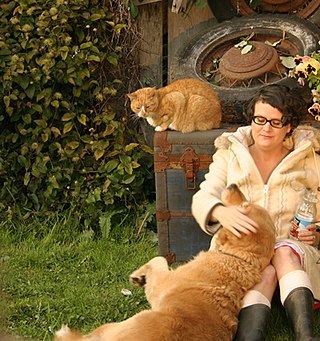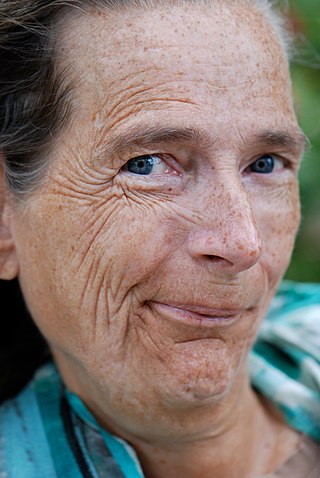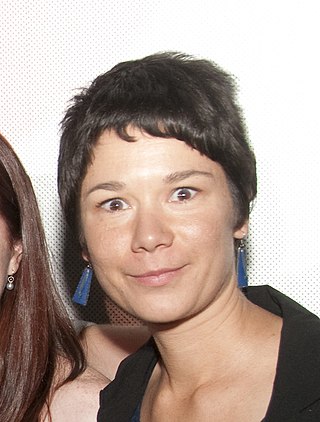| Shameless: The ART of Disability | |
|---|---|
| Directed by | Bonnie Sherr Klein |
Production company | |
Release date |
|
| Country | Canada |
| Language | English |
Shameless: The ART of Disability is a documentary film by Bonnie Sherr Klein about persons with disabilities. Produced in 2006 by the National Film Board of Canada, it is Klein's first film since a catastrophic stroke in 1987 left her a quadriplegic. The film explores disability culture and the transformational power art has for people with disabilities. [1] [2]
Klein is featured in the film, along with fellow artists with disabilities Catherine Frazee, a poet and writer; humourist David Roche; dancer and choreographer Geoff McMurchy; and writer and artist Persimmon Blackbridge. Vancouver musician Veda Hille contributed music for the film. [1] [3] [4]
Klein gathers these artists for a pyjama party where they explore Hollywood stereotypes of people with disabilities. The artists decide to meet a year later at Vancouver's Kickstart Festival with the intent of creating their own images of disability. [1] [4]
The film is set mainly in British Columbia, in Vancouver, Roberts Creek and Hornby Island, with brief sequences in San Francisco and Nova Scotia's Annapolis Valley. [3]

Naomi Klein is a Canadian author, social activist, and filmmaker known for her political analyses; support of ecofeminism, organized labour, and leftism; and criticism of corporate globalization, fascism, ecofascism and capitalism. As of 2021, she is an associate professor, and professor of climate justice at the University of British Columbia, co-directing a Centre for Climate Justice.

Alanis Obomsawin, is an Abenaki American-Canadian filmmaker, singer, artist, and activist primarily known for her documentary films. Born in New Hampshire, United States and raised primarily in Quebec, Canada, she has written and directed many National Film Board of Canada documentaries on First Nations issues. Obomsawin is a member of Film Fatales independent women filmmakers.

Veda Hille is a Canadian singer-songwriter, keyboardist and tenor guitar player from Vancouver, British Columbia. She writes songs about love and tragedy, as well as about topical British Columbia subjects. As well as solo work, she has taken part in many musical collaborations, and has organized two recording projects, Duplex! and The Fits.
Participatory video (PV) is a form of participatory media in which a group or community creates their own film. The idea behind this is that making a video is easy and accessible, and is a great way of bringing people together to explore issues, voice concerns or simply to be creative and tell stories. It is therefore primarily about process, though high quality and accessible films (products) can be created using these methods if that is a desired outcome. This process can be very empowering, enabling a group or community to take their own action to solve their own problems, and also to communicate their needs and ideas to decision-makers and/or other groups and communities. As such, PV can be a highly effective tool to engage and mobilise marginalised people, and to help them to implement their own forms of sustainable development based on local needs.

Catherine Frazee is a Canadian educator, activist, researcher, poet and writer. She is currently professor emerita in the School of Disability Studies at Toronto Metropolitan University. Prior to her retirement from Ryerson in 2010, she served for a decade as professor of distinction and as co-director of the Ryerson/RBC Institute for Disability Studies Research and Education. She is known for her role as Chief Commissioner of the Ontario Human Rights Commission from 1989 to 1992. Her father was prominent Canadian banker Rowland Cardwell Frazee.
Bonnie Sherr Klein is a feminist filmmaker, author and disability rights activist.
Tony Ianzelo is a Canadian documentary director and cinematographer.

Not a Love Story: A Film About Pornography is a Canadian documentary film about the pornography industry, directed by Bonnie Sherr Klein and released in 1981.
Lindalee Tracey was a Canadian broadcast journalist, documentary filmmaker, writer, and exotic dancer. She is best known for the documentary film Not a Love Story, a controversial 1981 film about pornography. Her credits include work on many films on controversial topics.
Carts of Darkness is a 2008 National Film Board of Canada documentary film by Murray Siple about a group of homeless men in the city of North Vancouver, who use shopping carts to collect bottles and cans to return for money and also race down the city's steep slope for thrills.

Disability in the arts is an aspect within various arts disciplines of inclusive practices involving disability. It manifests itself in the output and mission of some stage and modern dance performing-arts companies, and as the subject matter of individual works of art, such as the work of specific painters and those who draw.
Terre Nash is a Canadian Oscar-winning film director. Her 1982 short documentary If You Love This Planet won the Academy Award for Best Documentary.
Bob Christie is a Canadian documentary film director from Vancouver, British Columbia, Canada. He is best known for the 2009 documentary Beyond Gay: The Politics of Pride, which he directed, co-wrote and co-produced.
John Kemeny was a Hungarian-Canadian film producer whom the Toronto Star called "the forgotten giant of Canadian film history and...the most successful producer in Canadian history." His production credits include The Apprenticeship of Duddy Kravitz, Atlantic City, and Quest for Fire.
Karen Cho is a Chinese-Canadian documentary filmmaker from Montreal, Quebec, Canada. Her credits include the 2004 National Film Board of Canada (NFB) documentary In The Shadow Of Gold Mountain, documenting the effects of the Chinese Exclusion Act in Canada; the 2009 InformAction documentary Seeking Refuge; and the 2012 NFB documentary Status Quo? The Unfinished Business of Feminism in Canada, which was named best documentary at the Whistler Film Festival. Many of her films are political, featuring themes such as feminism and racism.
Persimmon Blackbridge is a Canadian writer and artist whose work focuses on feminist, lesbian, disability and mental health issues. She identifies herself as a lesbian, a person with a disability and a feminist. Her work explores these intersections through her sculptures, writing, curation and performance. The novels she has written follow characters that are very similar to Blackbridge's own life experiences, allowing her to write honestly about her perspective. Blackbridge's struggle with her mental health has become a large part of her practice, and she uses her experience with mental health institutions to address her perspective on them. Blackbridge is involved in the film, SHAMELESS: The Art of Disability exploring the complexity of living with a disability. Her contributions to projects like this help destigmatize the attitudes towards people with disabilities. Blackbridge has won many awards for her work exploring her identity and the complexities that come with it.
Jason DaSilva is an American documentary film director, producer, writer, and disability rights activist best known for the Emmy Award-winning documentary, When I Walk. The Emmy award-winning film follows his diagnosis of primary progressive multiple sclerosis for seven years as he progresses from cane, to walker, to wheelchair. He is also the founder of the non-profit organization AXS Lab and of AXS Map, a crowd sourced Google map based platform which rates the accessibility of businesses.

Lisa Jackson is a Canadian Screen Award and Genie Award-winning Canadian and Anishinaabe filmmaker. Her films have been broadcast on APTN and Knowledge Network, as well as CBC's ZeD, Canadian Reflections and Newsworld and have screened at festivals including HotDocs, Edinburgh International Film Festival, Melbourne, Worldwide Short Film Festival and Berlin International Film Festival.

Studio D was the women's unit of the National Film Board of Canada (NFB) and the world's first publicly funded feminist filmmaking studio. In its 22-year history, it produced 134 films and won 3 Academy Awards. Cinema Canada once called it the "Jewel in the Crown Corporation."